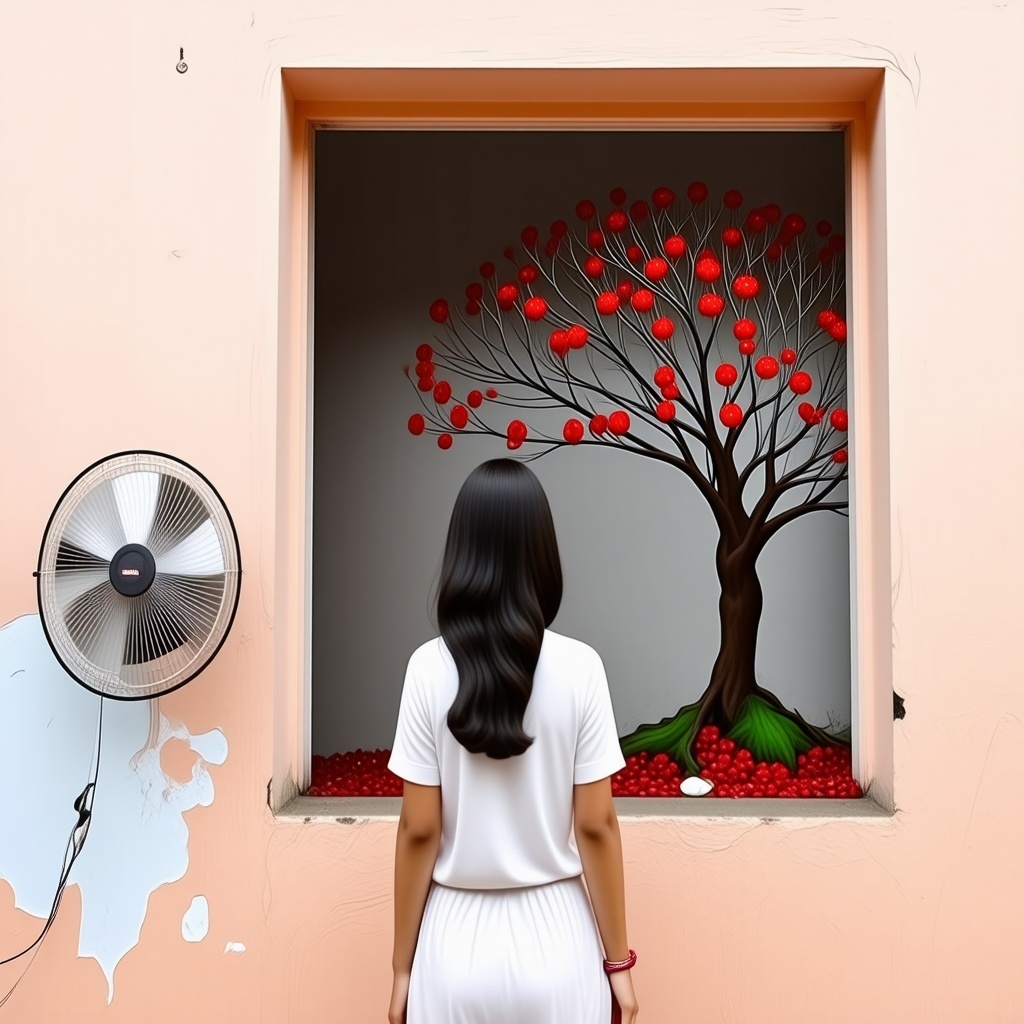The city didn’t welcome her with charm or warmth—just the shrug of a stranger. Like an old man on a bench offering you a seat without looking up. That kind of welcome.
She came with one suitcase and a ribbon tied around her wrist. Not for fashion. Not even to remember. Just to carry. To carry what was too heavy to speak of.
The new flat was above a bakery that always smelled of yeast, cardamom, and something nearly burnt. The walls were peach, the paint chipped like old memories. Her room had a fan that groaned in the silence, and a window that opened to a gulmohar tree losing its red petals like confessions.
“Back room?” the landlady squinted. “It’s yours if you don’t mind the noise.”
Noise didn’t bother her. The quiet did.
On the fifth day, she spoke to the tea vendor by the alley. He had eyes like molasses and a voice like an old song.
“You’re not from here,” he said, handing her chai.
“No,” she replied. “But I’m trying to be.”
He smiled. “Cities watch you. Before they let you in.”
She walked different now—shoulders square, steps quiet. Her ribbon always tucked inside her sleeve. Some days it felt tighter, like it remembered things she was trying to forget.
The library was dusty and full of secrets. She liked that. She liked the quiet corners and books no one touched. In the back of one, she found a photo. A cracked black-and-white, folded four ways, of a face she knew. A place she’d left. A fire they never named.
She didn’t speak of it.
She stopped returning to the bakery for three days. Then, on the fourth, the old woman behind the counter handed her a brown paper package. Inside: a ribbon—fresh, pale blue.
No note. Just the ribbon. And a look.
“You remind me of someone,” the woman said.
She nodded. “I remind myself of someone, too.”
The next morning, rain fell like needles. The wind tossed the petals of the gulmohar down like red warnings. On her doorstep was a letter. No stamp. No sender.
Five words: The bow comes undone eventually.
She folded it and placed it beneath her pillow.
A girl came the next evening. Barefoot. Hair wet. Ribbon tied tightly at her throat like a vow.
She didn’t ask who sent her. She knew.
They sat on the step, not speaking.
“I used to wear mine on my ankle,” the girl whispered. “Until it slipped.”
“I never let mine slip,” she replied.
The girl smiled. “But it’s fraying.”
She didn’t deny it.
Later that week, she took her ribbon off. Only for a moment. She watched the pale band fall into her lap, soft and tired. Her wrist felt naked. Not lighter. Just... bare.
She wore it again. This time in her hair.
When she passed the tea vendor, he looked up. "That ribbon suits you better now."
She smiled. Not like someone starting over. But someone who finally stopped running.
In her diary, she wrote: Some ghosts don’t haunt. They linger. Some memories don’t scream. They hum.
The city never asked her story. The trees never begged for her past. The people around her never dug for wounds.
But sometimes, at night, she’d hear the cry of a fox far away. And it sounded just like the scream she never let out.
She kept the photo. She kept the blue ribbon. She kept the silence.
And she stayed.
One afternoon, she heard a knock—soft, hesitant. It was the girl again, the ribboned one. Her eyes looked older than before. “There’s more of us,” she said quietly.
They met at dusk, behind the library, where the ground smelled of wet earth and jasmine. There were three others. One with a ribbon around her wrist like a secret. Another with hers looped through her braid. The last, silent, wore it like a sash.
No names were exchanged. Only tea. Only glances. Only breath.
Together, they sat in a circle and said nothing. But in the silence, stories floated up like mist.
She wasn’t alone anymore.
She returned home with soil under her nails, a pulse she hadn’t felt in years, and a ribbon no longer just a symbol of survival, but of connection.
The next morning, the city looked different. Not newer. But seen.
And her ribbon fluttered slightly in the breeze, not like a burden—but a flag.
She didn’t untie it. She didn’t need to anymore.
And when the days blurred into a quiet kind of hope, and the letters under her pillow began to yellow, she realized something—her past had not followed her to this city like a ghost. It had arrived like a mirror, showing her who she had become despite it all.
She still carried it, yes—but now, as a folded ribbon in her pocket, not a weight on her wrist.
And somewhere between chai sips and shared silences, she’d begun again.
Not as a porcelain figure with cracks hidden.
But as soft light slipping through those cracks—unapologetic, unforgotten, and finally free.



 React
React
 React
React
 React
React
 React
React
 React
React